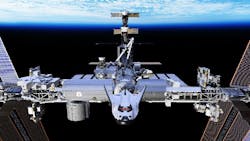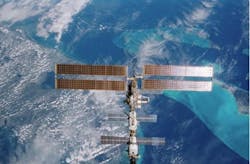Orbital completes COTS demonstration mission to International Space Station
DULLES, Va., 24 Oct. 2013. Space technology company Orbital Sciences Corp.’s (NYSE:ORB) Cygnus cargo logistics spacecraft unberthed from the International Space Station (ISS) following its 23-day stay at the station, concluding its demonstration mission and completing the Commercial Orbital Transportation Services (COTS) joint research-and-development initiative with NASA.
This week, Cygnus reentered Earth’s atmosphere over the Pacific Ocean east of New Zealand.
Cygnus Orbital is now ready to begin regularly scheduled resupply flights to the station later this year as part of a $1.9 billion Cargo Resupply Services (CRS) contract with NASA.
For the COTS demonstration mission, Orbital launched its Antares rocket carrying its Cygnus cargo logistics spacecraft on 18 September 2013 from the Mid-Atlantic Regional Spaceport (MARS), located at NASA’s Wallops Flight Facility in eastern Virginia. Following its launch and in-orbit testing and demonstration maneuvers, Cygnus rendezvoused and berthed with the ISS on 29 September. Prior to its departure from the station, the astronauts loaded the cargo module with nearly 3,000 pounds of unneeded items for disposal.
“With the COTS development phase now successfully completed, we are now turning our full attention to the eight operational resupply missions covered by our Commercial Resupply Services contract with NASA,” explains Frank Culbertson, Orbital’s executive vice president and general manager of its Advanced Programs Group. “Each Cygnus is capable of delivering a large quantity of pressurized cargo, totaling up to 20,000 kilograms over the eight missions, including crew supplies, spare parts and equipment, and scientific experiments for the ISS. We are looking forward to starting these missions in December.”
Over the past five years, Orbital privately developed the Antares launch vehicle to provide low-cost, reliable access to space for medium-class payloads, while also developing the Cygnus spacecraft in conjunction with NASA under the COTS program to meet the stringent safety requirements for ISS operations. Together these products showcased Orbital’s ability to apply commercial business practices and engineering approaches to significantly shorten development timelines and lower operational costs of sophisticated space systems as compared to traditional government-run programs.
“Congratulations to the teams at Orbital and NASA who worked hard to make this demonstration mission to the International Space Station an overwhelming success. Orbital’s success today is helping make NASA’s future exploration to farther destinations possible,” NASA Administrator Charles Bolden says.


